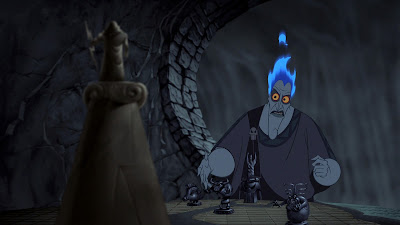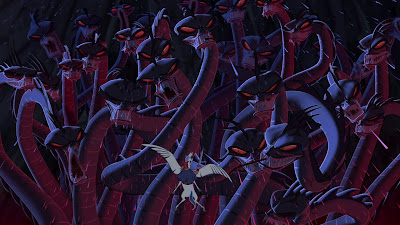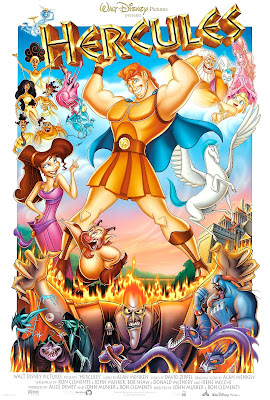Note: This review contains spoilers for Hercules (1997).
Towards the end of the Disney Renaissance, Disney released their 35th animated feature, Hercules, to good reviews from critics, but underperformed at the box office, especially in comparison to the Disney films that came before it. At the same time, the liberties taken with Greek mythology, especially the Hercules myths on which the film is based, angered Greece enough that the film didn’t have its planned premiere in the country. As a kid at the time, however, I was completely unaware of this and only remember watching it through someone else’s VHS copy, though only certain parts of the film stuck with me. Growing up, however, I got more familiar with the different elements of the film through the heavy representation in the Kingdom Hearts series until, eventually, I finally rewatched the film in time for its 25th anniversary. While I can see now how it’s not that great as an adaptation of the Hercules myth, I did still find it a great film in its own right.
In Ancient Greece, the gods Zeus (Rip Torn) and Hera (Samantha Eggar) have just had a son, Hercules. Although the other gods celebrate Hercules, Zeus’ brother Hades (James Woods) plans to overthrow Zeus and rule Mount Olympus. When the Fates warn him that Hercules will interfere with his plan in eighteen years, he gives his minions Pain (Bobcat Goldthwait) and Panic (Matt Frewer) murder a potion to make Hercules mortal so they can kill him. Pain and Panic are foiled when Hercules doesn’t drink the last drop of the potion, but Hercules is now stuck on Earth under the care of two childless farmers. Eighteen years later, Hercules (Josh Keaton) learns that he’s the son of Zeus and seeks to become a true hero so he can rejoin the gods on Mount Olympus.
Despite the many liberties taken with the source material, Hercules is a well-written film with a lot of heart. Hercules himself goes through a great character arc where he acts heroic for the sake of rejoining his father, but he learns that this is actually a pretty selfish form of heroism. This angle is even a part of the setting, where Thebes is presented not unlike New York City. Not only does this reimagining work surprisingly well for the sake of the setting, as Thebes itself was an important city in the ancient world, it allows room for visually showing off Hercules’ progression as a local hero, complete with a billboardesque mosaic and stores dedicated to selling his merch. Within the third act, however, Hercules learns a very important lesson: that being a true hero really means acting selflessly simply because it’s the right thing to do.
 |
| Hercules (Tate Donovan) learns that there's more to being a hero than defeating monsters. |
Hercules’ personal journey is assisted by the strength of its secondary characters, namely Megara (Susan Egan) and Philoctetes (Danny DeVito), aka Phil. Megara is more than just a love interest for Hercules, as she goes through her own character arc, skirting the line between good and bad and eventually realizing that even though she doesn’t want to fall in love, she eventually does. She’s also never once a real damsel in distress, even standing up to Hades and putting herself in harm’s way to help Hercules at one point. Her interactions with Hercules also draw out the screwball comedy element of the script, as does Phil. Though Phil plays more of a supporting role, the idea of someone training famous yet failed heroes across history is an interesting one, as is his desire to finally train someone he can be proud of. As with Hercules, he also learns what being a true hero means, even if this lesson comes to him indirectly.
Then there’s Hades, perhaps one of Disney’s most memorable villains. When his fast-talking manner of speech isn’t making the audience laugh, it shows off just how underhanded and sleazy he really is, as is fitting for the lord of the dead. Pretty much any scene he’s in leaves an impression on the audience and, if nothing else, he’s easily a big reason to watch the film alone.
 |
| Hades (James Woods) leaves an impression. |
Another interesting aspect of Hercules is how it manages to incorporate a healthy dose of comedy without turning into a complete farce, as well as incorporate certain elements or do its own thing without necessarily feeling unrealistic or inaccurate. While Hercules himself didn’t do at least half the things in the myth that he does in the film, it still acknowledges the twelve labors that he’s famous for performing and since this is a Disney production, it makes sense that the film would tone down or ignore the more adult parts of the myth to make it suitable for general audiences. While Thebes includes some anachronistic elements like traffic stops or certain types of merchandise, they are adapted to fit more naturally within the setting and are handled in a broad strokes sort of way so it feels more timeless.
Something I noticed on this viewing as well was how similar some plot elements are to Superman. Much like Kal-El, Hercules was born to godlike parents, in this case actual gods, but raised by mortal farmers on Earth. Years later, after growing up different from everyone else, he learns about his true heritage from his real father and learns how to use his powers to help humanity. If you dig deeper, you can also find similarities between each series’ villain and supporting cast, with Megara standing in for Lois Lane, Pegasus (Frank Welker) for Krypto and Hades for Lex Luthor. When viewed this way, one could argue that compared to the more recent films starring the man of steel, Hercules is a better representation of the Superman story, adding in a character arc where Hercules grows into the role.
Compared to other Disney films produced at the time, Hercules stands out for its unique art style, which, fittingly enough, seems to incorporate elements from Ancient Greek pottery. Speaking of, pottery is sometimes incorporated into the story through montage sequences that help advance the story and maintain a tight pace. Even with these unique touches, the film still lives up to the level of quality one would expect from a Disney film, including great water effects and detailed, but stylized environments. Hades also has some of the best animation, especially his flames, which help visualize his mood. There are some noticeable uses of CG, though it’s pretty minimal, outside of the completely justifiable use in the complex and dynamic Hydra sequence.
 |
| The Hydra sequence incorporates a good amount of CG. |
Just as good as the animation is the voice acting, especially from Josh Keaton and Tate Donovan as Hercules at two different points of his life, as well as James Woods as Hades. As expected, the songs are well-written, even if I personally didn’t remember most of them, and incorporating a gospel choir from the Muses, who also act as narrators, is an interesting choice that stands out.
Despite the numerous differences from its inspiration,
Hercules is a Disney film that deserves more recognition. Its unique art
style, incredible animation and well-written message, not to mention its highly
memorable villain, make it thoroughly entertaining and well worth the watch.


No comments:
Post a Comment